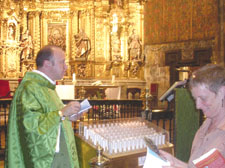|
|
 |
| |
| |

The pilgim blessing |
Song speeds pilgrim’s progress
PREVIEW: MERLYN QUAIFE: CAMINO DE SANTIAGO
St George’s Bloomsbury
EACH year, more than 100,000 walkers plod along the Camino de Santiago de Compostela, the historic Way of St James pilgrimage route across north-west Spain.
Distinguished Australian soprano Merlyn Quaife joined the pilgrims on the 500-mile route, starting in Orthez.
As a soprano with song just waiting to be heard, she added greatly to her experience by singing in the medieval pilgrim churches along the way, sometimes in empty churches, sometimes at pilgrim masses.
The songs, by various composers – Mozart, Schubert, Weill and Dvorak among them – are ones Merlyn has sung in operas, concerts and recitals all over the world.
She has turned her singing pilgrimage into a remarkable performance that has achieved widespread popularity in Australia, recently being recorded by the Australian Broadcasting Commission.
This Sunday evening, in the first performance outside Australia, she will be singing some of the songs she sung en route and talking about the pilgrimage at St George’s Bloomsbury, accompanied by Australian pianist Clare Clements.
“I decided to walk the Camino de Santiago after a complete physical and emotional collapse,”she says.
“It was a time for reflection, simply being and being simple. For me, the journey was a greater experience than any of my recital, concert or opera performances and it made a major contribution to restoring my health, my inner being. Every empty church was an invitation to sing, even if only a few lines.
“And I sang snippets of songs as I walked along the way.
“I attended any church mass with a pilgrim blessing, singing along with the pilgrims.
“In all, I walked for 36 days from Orthez to Santiago.
“I did take the bus once, cutting out 60 kilometres, when it was very hot and I was falling behind.
“Although I haven’t counted, I probably sang in at least 25 churches.
“But my personal highlight was singing in the pilgrim mass at Santiago de Compostela, the best way of saying thank you for what the Way of St James had
given me.’
|
 |
|
|
 |
|
|
 |
|








